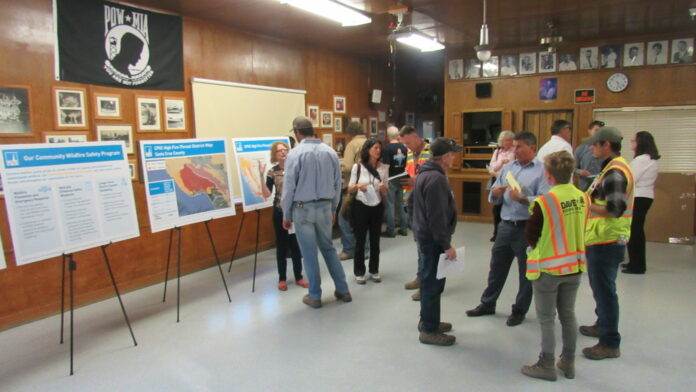Kevin Collins, private citizen, resident of Lompico canyon and PG&E ratepayer, explained and defended his formal complaint to the California Public Utilities Commission about PG&E’s tree cutting program to an administrative law judge in a prehearing conference in Santa Cruz last Friday.
Collins testimony to Judge Debbie Chiv explained why his 13-page complaint concludes PG&E’s Community Wildfire Safety Program is “destructive, misleading, and will fail to solve the problem of electric utility caused wildfires,” when the real problem, according to Collins, is aging infrastructure PG&E has failed to modernize.
Collins was at times passionate about the urgency of the problem of utility related wildfires, which he claims is less related to trees falling on power lines than the obsolete and “extremely fragile” power lines themselves, which PG&E has failed to upgrade with modern technology that would eliminate “hot, arching, broken lines” that ignite fires. Throughout Collins testimony, chief counsel for PG&E’s operation division, Alyssa Koo, listened carefully, and answered questions from the judge.
Collins testimony summarized his complaint that PG&E is in gross violation of basic, minimum safety standards with uninsulated power lines that are often spliced together between old poles, combined with “1950’s era” circuit protection systems and the overall failure of PG&E to “harden” and upgrade their distribution lines, which he claims is the real culprit behind utility related wildfires, not the “vegetation” that has grown up around them.
According to Collins, PG&E’s Community Wildfire Safety Program ignores the problem of aging infrastructure, and shifts the burden to home and landowners who are expected “to endure the harm to their property” under the misleading assumption that “vegetation is the primary reason for utility related wildfires,” when the real issue is the failure to invest in upgrading infrastructure, according to Collin’s complaint. “The issue of cost tends to overwhelm considerations of safety,” Collins said.
Judge Chiv said the complaint was unusual because it has state-wide ramifications, and normally complaints from individual ratepayers involve a violation of a rule or an injury to an individual- not the indictment of a utility-wide policy. Judge Chiv explained the prehearing conference was essentially “procedural”, that no legal decision on the merits of the compliant would be made by her, but her recommendation to the PUC would determine how the complaint “will be categorized,” and how remedies for the complaint should be pursued.
After Collins testimony, Judge Chiv said there were “several parallel processes” underway within the PUC regarding evaluation of PG&E’s safety programs as well as legislative rule making. Judge Chiv indicated the best remedy for the complaint was for Collins to participate in hearings on Senate Bill 901, a legislative oversight bill that will review PG&E’s safety programs and liability for wildfires.
Collins insisted the technology available to PG&E to stop the “flash arching” of broken lines with modern equipment is currently “on the shelf”, is currently used by other utilities, and does not require extensive study or testing, and that he personally didn’t have the resources to engage in months of public hearings.
PG&E chief counsel Koo told the judge the objections to the Community Wildfire Safety Program was based on a “fundamental misunderstanding” because it is the most direst interaction between PG&E and property owners, but much was going on “internally” in terms of system upgrades ratepayers are not aware of. Koo said PG&E is already engaged in pilot programs for new technology as well as a 10-year plan of “system hardening”, but with over 100,000 miles of overhead conductors, “we are doing what we can, and unfortunately it takes time for the entire system,” Koo said.
“There has been a lack of a sense of the importance of these issues until these disasters arose,” Collins countered. “I find this amazing,” Collins said to the judge, “with all the people who have been killed by electrocution, as well as in the wildfires…all I can do is emphasize the urgency of replacing this equipment. We don’t need a lengthy testing and evaluation process, we need this aging equipment replaced-now,” Collins said.
Judge Chiv maintained to Collins that, “the relief you are requesting is not appropriate for an individual’s complaint,” and that the SB 901 rulemaking hearings scheduled within the next six months was likely the most appropriate forum for what Collins was requesting PG&E to do. Judge Chiv indicated a legal determination of how Collins’ complaint will be handled by the PUC will be forthcoming that will include a “scoping memo” of the issues involved in the hearing.
After the hearing, Collins felt that the issues he raised in his complaint “had been heard,” but also the PUC “seems designed to protect the utilities.”












